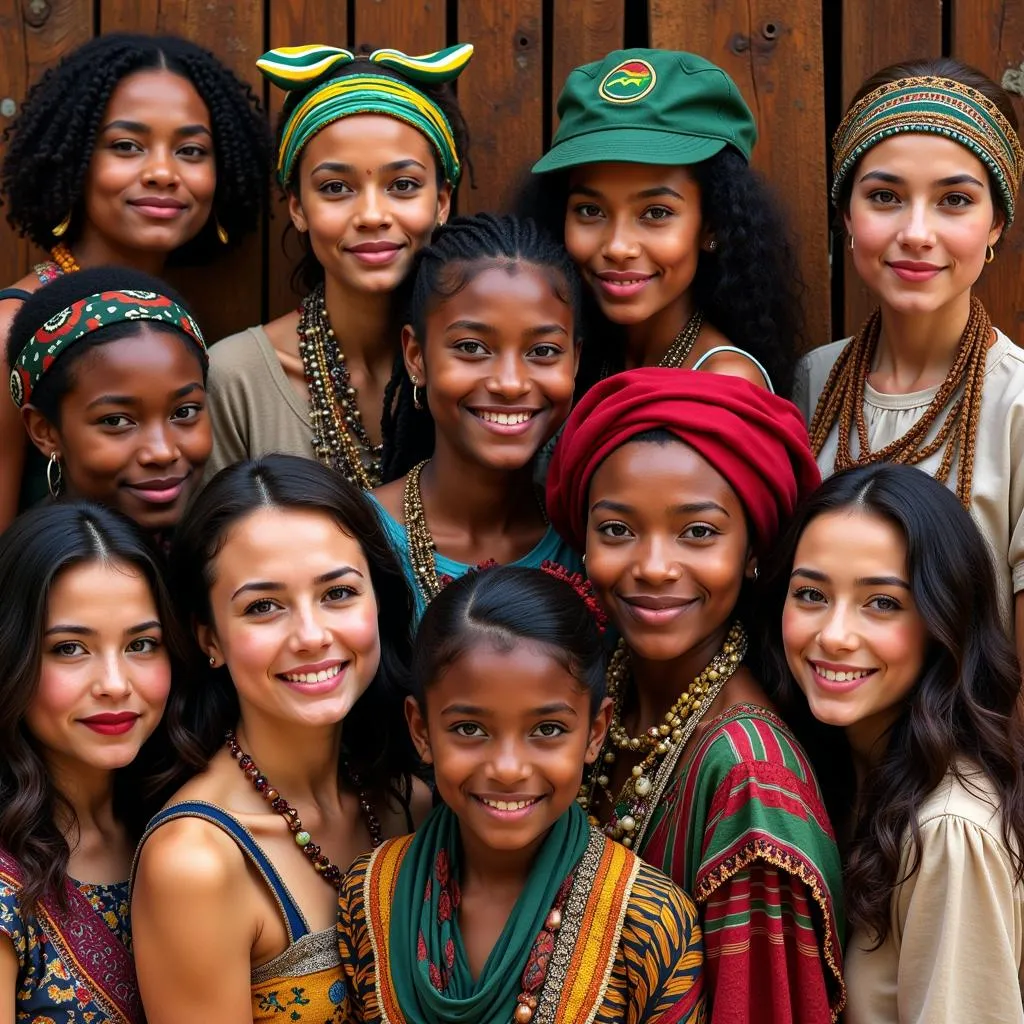African Hair Spirituality: A Deep Dive into Tradition and Culture
African Hair Spirituality is a rich tapestry woven with threads of tradition, identity, and connection to the divine. For centuries, hair has held a profound significance beyond mere aesthetics, serving as a powerful symbol of cultural pride, social status, and spiritual belief across the diverse communities of the African continent. From the intricate braids of the Himba people of Namibia to the elaborate hairstyles of the Yoruba in Nigeria, each strand speaks volumes about a community’s unique history and worldview. We’ll explore the captivating world of African hair spirituality, delving into its diverse expressions and the deep-rooted beliefs that shape its significance.
Unveiling the Spiritual Significance of African Hair
In many African cultures, hair is believed to be a direct link to the spiritual realm, a conduit through which individuals can communicate with their ancestors and deities. This belief stems from the idea that the head is the highest point of the body, closest to the heavens and therefore, a sacred portal. The hair, growing from this sacred space, is seen as an extension of this spiritual connection. This reverence for hair explains the meticulous care and attention devoted to its styling and maintenance, often involving elaborate rituals and ceremonies. These practices are not simply about aesthetics but about honoring this spiritual link and maintaining a harmonious relationship with the divine.
It’s important to note that specific beliefs and practices related to African hair spirituality vary widely across different ethnic groups and regions. For instance, some communities believe that hair possesses its own unique energy and life force, capable of influencing an individual’s destiny.
After understanding the basics, you might want to learn more about specific accessories. Check out African beaded headbands.
The Power of Braids and Styles: More Than Just Aesthetics
Braiding, twisting, and other forms of hair styling are not merely fashionable expressions in African culture; they are intricate art forms imbued with deep symbolic meaning. Different hairstyles can signify a person’s age, marital status, social standing, or even their spiritual affiliation. The intricate patterns and designs woven into the hair often tell stories, convey messages, or represent specific cultural values. For example, some braids represent unity and community, while others symbolize strength and resilience.
The process of hairstyling itself is often a communal activity, strengthening social bonds and transmitting cultural knowledge across generations. Older women often teach younger girls the art of braiding, passing down not just technical skills but also the rich cultural and spiritual heritage associated with each style. This intergenerational exchange ensures the continuity of these traditions and reinforces the importance of hair as a cultural and spiritual anchor.
Consider exploring our collection of African artwork paintings for a broader understanding of cultural expression.
Maintaining and Caring for Sacred Strands: Rituals and Practices
The maintenance and care of hair are often accompanied by specific rituals and practices that reflect the spiritual reverence it holds. Natural ingredients, such as herbs, oils, and butters, are commonly used not only for their nourishing properties but also for their symbolic meanings and spiritual potency. Certain plants are believed to possess protective qualities or the ability to enhance spiritual connection. For example, shea butter, widely used across West Africa, is valued for its moisturizing properties as well as its symbolic connection to fertility and abundance.
Some communities observe specific taboos related to hair, such as restrictions on cutting or styling hair during certain periods or life events. These practices are often rooted in beliefs about preserving spiritual energy and maintaining a harmonious balance with the natural world.
African Hair Spirituality in the Modern World: Navigating Cultural Appropriation
In recent times, African hairstyles have gained global popularity, leading to important discussions about cultural appropriation. While appreciation for different cultures is essential, it’s crucial to distinguish between respectful admiration and appropriation, which involves adopting elements of a culture without understanding or acknowledging their original significance.
Learn more about African American hair twists and their cultural context to better understand the nuances of this complex issue.
Conclusion: Embracing the Legacy of African Hair Spirituality
African hair spirituality is a testament to the profound connection between culture, spirituality, and personal identity. It’s a celebration of the rich heritage and diverse traditions of the African continent, where hair is not just a physical attribute but a powerful symbol of connection to the divine, ancestral wisdom, and community. By understanding the depth and complexity of these beliefs, we can appreciate the true beauty and significance of African hair and contribute to its preservation for generations to come. Remember to check out African head wraps and accessories to further delve into the world of African adornment.
FAQ
- What is the spiritual significance of hair in African culture? Hair is often seen as a spiritual connection to ancestors and the divine.
- How do African hairstyles reflect cultural identity? Different hairstyles can indicate age, status, and spiritual affiliation.
- What are some common hair care practices in African culture? Natural ingredients like shea butter and herbs are often used.
- Why is cultural appropriation of African hairstyles problematic? It disrespects the cultural and spiritual significance of these styles.
- How can I appreciate African hairstyles respectfully? Learn about their cultural context and significance.
- What role do elders play in preserving hair traditions? They teach younger generations the art of braiding and its cultural meaning.
- Are there any taboos associated with hair in African cultures? Yes, some cultures have restrictions on cutting or styling hair during certain times.
Suggested Readings and Related Articles
- Explore the symbolism of African masks and their connection to spirituality.
- Learn about the role of music and dance in African rituals and ceremonies.
- Discover the diverse traditional clothing styles across the African continent.
Need More Information?
For any further inquiries or support regarding African culture and heritage, please don’t hesitate to contact us.
- Phone: +255768904061
- Email: kaka.mag@gmail.com
- Address: Mbarali DC Mawindi, Kangaga, Tanzania
Our dedicated customer service team is available 24/7 to assist you.

